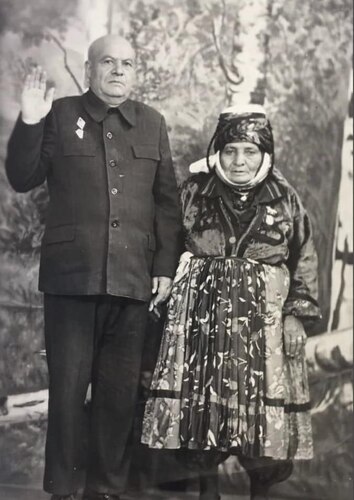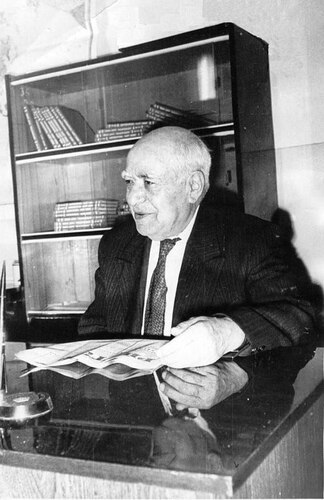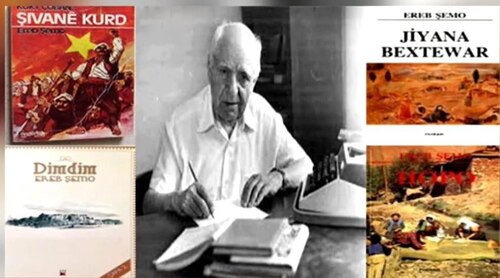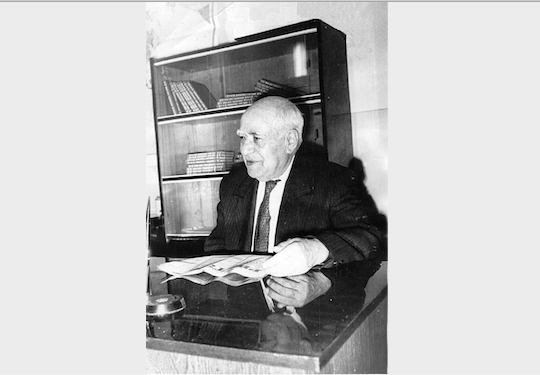Solin Wirme
Arabi Shamo is a man who began his life in poverty and work and later became a famous Kurdish writer and researcher. He became one of the most important Kurdish authors of the 20th century.
Arabi Shamo was born on October 23, 1897, in the village of Susz in the Digor district of Qarse. As a result of the war between the Ottoman Empire and Russia in 1877-1878, the city of Qarse fell to the Russians; the city was annexed during the establishment of the Republic of Turkey. The village of Susz was a village of the Yezidi Kurds. Arabi Shamo's family was a Yazidi family too. Shamo is his father's name. Thus, Arabi Shamo means Arabi son of Shamo. His family was poor, his father was always a shepherd, cattleman, and rancher.

Initially, Arabi Shamo attended a Russian school as a child. He soon became the best student. As a child, Arabi faced the difficulties of life. At the same time, he studied and worked in the houses of wealthy Russians, Armenians, Turks, and Azeris. Arabi Shamo had to learn their languages because he worked in foreign houses. That is why he spoke seven languages: Russian, Armenian, Turkish, Greek, Azerbaijani, German, and Georgian.
During World War I, when Russia and Turkey were at war, the Russian army camped near the village of Arabi Shamo and was informed that there was someone in the village who spoke several foreign languages. That is why they call him and he stays on as a language translator in the Russian army. Thus he remained between 1914 and 1916 as an interpreter in the Russian army. He then went to Sarqamshe and worked for two years in the construction of the railway. During those two years, he met many Russian people who were educated, scholarly, and revolutionary.

Arabi Shamo lived in Stavrapola, Russia, for a month. At that time, the October Revolution took place in Russia and the Communist Party came to power. Arabi Shamo also decided to join the Soviet army. In 1918, he became a member of the Russian Communist Party. In 1920, he went to Moscow and studied at the Lazarian University for four years. In 1924, he returned to Armenia. In Armenia, the Soviet government was in power. He also held a position at the headquarters of the Communist Party of Armenia.
In Armenia, Arabi Shamo participated in the education of Kurdish nomads and taught them Kurdish. He opened schools and libraries in the villages. The government would solve their problems. He wrote various articles on Kurdish life in Armenian newspapers and magazines.
In 1927, the Armenian government decided to prepare a Kurdish alphabet. Two were appointed to this task; the first was Ishaq Maragulov, a Kurd, and the other was Arabi Shamo. They created a Kurdish alphabet that was somewhat different from that of Jaladat Badr Khan because some letters of the alphabet are derived from Krill. Shamo and Maragulov's work was published under the title "Teach Yourself Kurdish".

In 1930, the newspaper Reya Taze was founded. Arabi Shamo played a fundamental role in the establishment and promotion of the newspaper Reya Taze and he and his friends traveled from village to village, from city to city, and delivered the newspapers to the Kurds. Arabi Shamo was one of the editors of the newspaper. In fact, Arabi Shamo was the forerunner of Kurdish literature and language in the Caucasus.
Arabi Shamo has several works as follows:
Kurmanj Shepherd
It is the first Kurdish novel. In fact, Kurmanj Shepherd became a method for other Kurdish novels. This novel has been published in several foreign languages. The novel was published in Russian in 1931, and it was also published in Turkish.
Arabi's novel "Kurmanj Shepherd" begins with Arabi Shamo's childhood experience. The novel is written in Kurmanji dialect. He also mentioned many nations in the novel. He wrote about their relationships and shared their views, thoughts, and beliefs about life. This novel deals with the life of Kurdish nomads and villagers.
The novel "Happy Life"
Happy Life is Arabi Shamo's second novel, published in 1959.
The novel Happy Life mentions many events such as migration, war, marriage, mourning, and revolution. The life of the Kurdish nation at that time is discussed. The novel "Happy Life" is also the history of the Kurdish people who migrated from their homeland to Russia because of the oppression of the Ottomans.

The novel "Dimdim"
Dimdim is Arabi Shamo's third novel, published in 1969. Dimdim is a mountain in the East part of Kurdistan, located in the north of the East part of Kurdistan. The story of Dimdim Castle has been told in stories in communities by singers for hundreds of years. In the novel, Arabi Shamo talks about Emir "Lapzerin", his bravery, the experience of the Kurdish tribes, and the war and life of the Kurds at that time.
The novel Hoppo
Hopo is Arabi Shamo's last novel. This novel was published in 1969. There is more dialogue in this novel than in the other three novels and Arabi Shamo has successfully placed these dialogues in the novel. In his novel Hopo, Arabi Shamo mentions many Kurdish customs and traditions. He wanted to introduce their social life. He talked about everything in the novel.
In addition to writing novels, Arabi Shamo has written several articles and stories, as well as being a journalist and has many other works.
Arabi Shamo died in 1978 at the age of 81. He was buried in a grand ceremony in the Yerevan cemetery.









